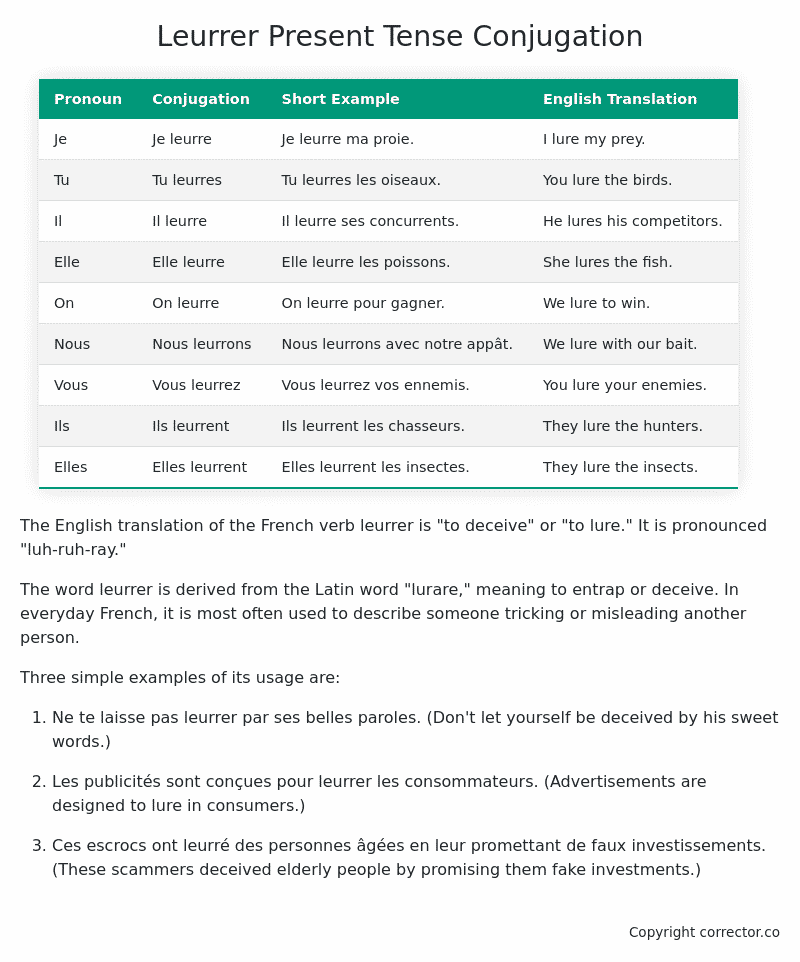Le Present (Present Tense) Conjugation of the French Verb leurrer
Introduction to the verb leurrer
The English translation of the French verb leurrer is “to deceive” or “to lure.” It is pronounced “luh-ruh-ray.”
The word leurrer is derived from the Latin word “lurare,” meaning to entrap or deceive. In everyday French, it is most often used to describe someone tricking or misleading another person.
Three simple examples of its usage are:
-
Ne te laisse pas leurrer par ses belles paroles. (Don’t let yourself be deceived by his sweet words.)
-
Les publicités sont conçues pour leurrer les consommateurs. (Advertisements are designed to lure in consumers.)
-
Ces escrocs ont leurré des personnes âgées en leur promettant de faux investissements. (These scammers deceived elderly people by promising them fake investments.)
Leurrer – About the French Present Tense
To take a deep dive into all the French tenses then see our article on Mastering French Tense Conjugation.
Common Everyday Usage Patterns For Le Present
Interactions with Other Tenses
Table of the Present Tense Conjugation of leurrer
| Pronoun | Conjugation | Short Example | English Translation |
|---|---|---|---|
| Je | Je leurre | Je leurre ma proie. | I lure my prey. |
| Tu | Tu leurres | Tu leurres les oiseaux. | You lure the birds. |
| Il | Il leurre | Il leurre ses concurrents. | He lures his competitors. |
| Elle | Elle leurre | Elle leurre les poissons. | She lures the fish. |
| On | On leurre | On leurre pour gagner. | We lure to win. |
| Nous | Nous leurrons | Nous leurrons avec notre appât. | We lure with our bait. |
| Vous | Vous leurrez | Vous leurrez vos ennemis. | You lure your enemies. |
| Ils | Ils leurrent | Ils leurrent les chasseurs. | They lure the hunters. |
| Elles | Elles leurrent | Elles leurrent les insectes. | They lure the insects. |
Other Conjugations for Leurrer.
Le Present (Present Tense) Conjugation of the French Verb leurrer (this article)
Imparfait (Imperfect) Tense Conjugation of the French Verb leurrer
Passé Simple (Simple Past) Tense Conjugation of the French Verb leurrer
Passé Composé (Present Perfect) Tense Conjugation of the French Verb leurrer
Futur Simple (Simple Future) Tense Conjugation of the French Verb leurrer
Futur Proche (Near Future) Tense Conjugation of the French Verb leurrer
Plus-que-parfait (Pluperfect) Tense Conjugation of the French Verb leurrer
Passé Antérieur (Past Anterior) Tense Conjugation of the French Verb leurrer
Futur Antérieur (Future Anterior) Tense Conjugation of the French Verb leurrer
Subjonctif Présent (Subjunctive Present) Tense Conjugation of the French Verb leurrer
Subjonctif Passé (Subjunctive Past) Tense Conjugation of the French Verb leurrer
Subjonctif Imparfait (Subjunctive Imperfect) Tense Conjugation of the French Verb leurrer
Subjonctif Plus-que-parfait (Subjunctive Pluperfect) Tense Conjugation of the French Verb leurrer
Conditionnel Présent (Conditional Present) Tense Conjugation of the French Verb leurrer
Conditionnel Passé (Conditional Past) Tense Conjugation of the French Verb leurrer
L’impératif Présent (Imperative Present) Tense Conjugation of the French Verb leurrer
L’infinitif Présent (Infinitive Present) Tense Conjugation of the French Verb leurrer
Struggling with French verbs or the language in general? Why not use our free French Grammar Checker – no registration required!
Get a FREE Download Study Sheet of this Conjugation 🔥
Simply right click the image below, click “save image” and get your free reference for the leurrer Present Tense tense conjugation!

I hope you enjoyed this article on the verb leurrer. Still in a learning mood? Check out another TOTALLY random French verb present conjugation!


